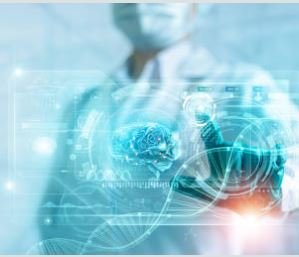The Impact of Technology in Healthcare: Improving Care and Transforming the Medical Sector
The Impact of Technology in Healthcare: Improving Care and Transforming the Medical Sector
Technology is one of the major factors contributing to improving healthcare and dramatically transforming the medical care industry. Through technological advancement, innovative solutions and effective tools have been provided to diagnose and treat diseases and improve the quality of healthcare in general. In this article, we will discuss some important titles that highlight the role and importance of technology in the medical field and how it is used in the medical field, in addition to the most widely used medical technology and its impact in modern healthcare.
How has technology improved health care?
Improving diagnosis: The use of advanced technology such as medical images and genetic analysis helps diagnose diseases more accurately and in a faster time.
Development of treatment: Technology provides new techniques for treating diseases, such as robotic surgery, laser therapy, and targeted radiation therapy.
Enhancing communication: The use of technological media helps improve communication between patients and health care teams and provide care remotely.
Facilitating health information management: Electronic medical records and health information management systems provide secure storage and easy access to medical information for patients and health professionals.
The value of medical technology:
Improving the quality of care: Technology contributes to improving the quality of health care by improving diagnosis and treatment and providing personalized and effective care.
Increased efficiency: Technology can help improve the efficiency of medical operations, reduce medical errors, and improve patient experience.
Cost savings: Technology can reduce medical costs by improving early diagnosis and disease prevention and reducing the number of unnecessary hospital visits.
The top 5 trends and innovations in healthcare technology:
Artificial intelligence and machine learning: Artificial intelligence and machine learning are used to analyze huge medical data and provide accurate diagnoses and specific treatment recommendations.
Virtual Reality and Augmented Reality: Virtual reality and augmented reality are used in medical training and education, improving patient experience, providing precise surgeries, and simulating complex medical operations.
Connected Things Technology: Connected Things technology allows medical devices and patients to be monitored remotely and continuously collect vital data to improve healthcare.
Robotic surgery: Robots are used in precise and high-precision surgery, which reduces risks and helps in faster recovery for patients.
Biotechnology: Biotechnology involves the use of biological tools and devices such as artificial organs, engineered tissues, and gene therapies to improve health and treat diseases.
Technology in medicine: its advantages and disadvantages
Advantages:
Technology contributes to improving diagnosis and treatment, saving time and effort, improving patient comfort, and enhancing communication between medical teams and patients.
Disadvantages:
The technology can be expensive, requires extensive training for effective use, and may raise privacy and cybersecurity concerns.
Why is medical technology so important?
Medical technology plays a vital role in improving healthcare and making significant progress in this field. Here are some reasons why medical technology is so important:
Improving the quality of life: Modern medical technologies help improve the quality of life for individuals by diagnosing early diseases and providing effective and innovative treatments.
Reducing health risks: Medical technology contributes to early detection of diseases, improved diagnosis and prevention, which reduces health risks and limits the occurrence of complications.
Increase efficiency and save time: Medical technologies provide more efficient and rapid diagnosis and treatment processes, saving time and effort for patients and medical teams.
Improving care: Medical technology provides tools and technologies to improve patient comfort and provide personalized and effective care.
How is technology used in medicine?
Technology is used in medicine in many and varied ways, including but not limited to:
Advanced diagnosis: Technologies such as medical images (such as X-rays and MRI), genetic analysis, and advanced laboratory tests are used to diagnose diseases with high accuracy.
Innovative treatment: Medical technology provides new treatment techniques, such as robotic-assisted surgery, television surgery, guided radiography, and targeted radiation therapy.
Health information management: Technology contributes to the development of electronic health information management systems, which facilitates the exchange of information between medical teams and helps achieve integrated and coordinated health care.
Remote care: Technology can be used to provide remote health care, such as video medical consultations and remote health tracking, providing convenience and effective care for patients.
What is the most commonly used medical technology?
Medical technology includes many innovations and widely used tools. Among the most widely used medical technologies can be mentioned:
Surgical robots: Surgical robots are used in operations that require high precision, minimizing wounds, and reducing the recovery period.
Medical imaging devices: include X-rays, magnetic resonance imaging, and computed tomography, and help in diagnosing diseases and monitoring their development.
Portable medical devices: such as blood pressure monitors and blood sugar analyzers, which contribute to monitoring personal health status and prevention.
Wireless communication technologies: used to communicate between medical devices and transfer health data between patients and medical teams, which facilitates monitoring health status and providing care.
In conclusion, medical technology plays a vital role in improving healthcare and providing treatment. It contributes to improving the quality of life, reducing health risks, saving time, and improving patient comfort. As technology continues to evolve, new innovations are expected to emerge that enhance the effectiveness of diagnosis and treatment. However, this technology must be used ethically and responsibly, and not forget the value of humane care in the medical field.
